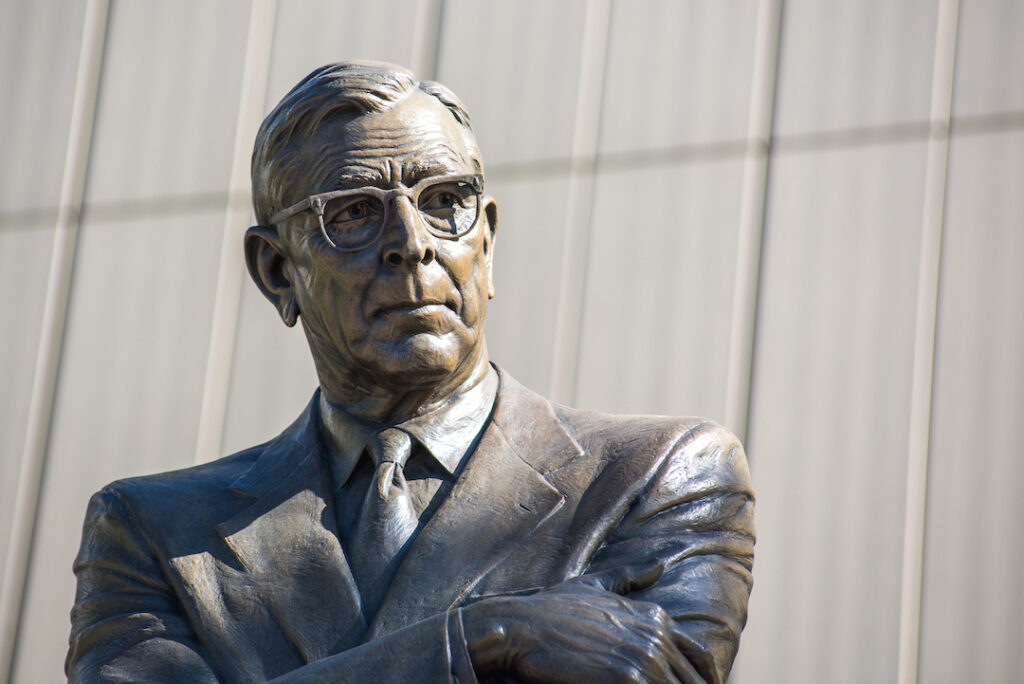Today’s collegiate and professional climate is competitive. It is a win-now climate. Thus, head coach selection has become one of the most important decisions a club owner, general manager (GM), University President, or athletic director (AD) will make. Search firms are often called upon to assist in finding the best candidates. And even this method arrives with holes in the process. Locating and selecting greatness at the head coach level is a rather tricky task. Search firms included.
Picking the right person for the job is elusive. The entire selection process is often repeated. ESPN.com reported that from January 1, 2010, until January 31, 2021, former head coaches received $533.6 million from their previous employers not to coach. In 2022 – 2023, 127 head coaching positions changed in college football, men’s basketball, and baseball. Let’s face it, there is no real solution to selecting the next John Wooden or Nick Saban. Or, for us baseballers, selecting the next Skip Bertman, for that matter. This process is not an exact science. History offers plenty of proof.
The goal of this blog post (and the next two) aims to reduce the failure rate in head coach selection by illustrating and examining three unseen indisputable traits and tendencies consistent with great coaches. Although this only scratches the surface of the in-depth process required in head coach selection, it reveals three non-negotiables of today’s great head coach. Non-negotiables aside, please understand targeted candidates have been associated with winning. They are considered winners. Because the athletic climate is a win-now climate, more W’s and less L’s matter. That is clear. Now that we’ve eliminated the obvious let us focus on the three non-negotiables. They are experience, emotional intelligence, and a growth mindset.
Today, we will examine the first non-negotiable unseen trait.
Experience matters, and becoming great at anything takes time. History says it may take decades to become great at anything. Coaching is no different. Take basketball coach John Wooden, a winner of ten national championships. Wooden began his head coaching career as a high school coach. After spending 13 years at the high school level, Wooden moved to Indiana State for three years. At UCLA, Coach Wooden would build his Bruin program over the next 15 years, winning his first national title in 1964. Coach Wooden was 53 years old. It was his 31st year as a head coach.
University of Alabama coach Nick Saban spent 22 years (21 as an assistant) before being hired as the head football coach at Michigan State in 1995. Saban would win his first national championship in 2003 as head coach of LSU. Saban was 52 years old and had coached for 30 years.
Like Wooden, college baseball coaching legend Skip Bertman began his career in high school. Bertman spent 11 years at Miami Beach High School before assisting Hall of Fame coach Ron Fraser at Miami for eight years. After 19 years, Bertman accepted the head baseball coaching position at LSU. Bertman spent the next seven years building his LSU program. He won his first of five national championships in his eighth season. Skip Bertman was 53 years old and had coached for 26 years.
Many examples align with these three coaches and their career paths. Names like Jackson, Smith, Lombardi, Auriemma, Staley, Mulkey, and Garrido are all comparable. It is the Who’s Who of coaching. And, remember, this is only football, men’s and women’s basketball, and baseball.
Further examination and research to cement that experience were vital to sustainable success includes the following: Coaching researchers Clifford Mallet and Sergio Lara-Bercial also show that an elite coach spends 18 to 20 years of coaching experience to produce championship-caliber teams at the highest level. The elite coaches’ average age falls between 40 and 64. Furthermore, research by Dr. Feng Xiong, Jean Cote, and Dr. Wade Gilbert reveals that preparation and repetition over decades separate great coaches from the rest. Studies also have indicated that it takes 10,000 hours to meet coaching efficacy (productiveness, efficiency, effectiveness).
Experience and preparation are common denominators when discussing elite status. The coaching performances over an extended period further separate and distinguish elite coaches from the norm. Where there is true greatness in coaching, experience lurks. Possessing experience is the first non-negotiable in selecting a great head coach.


